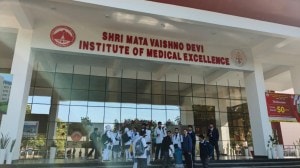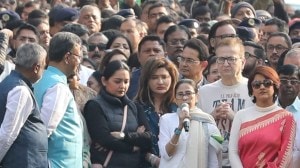A dip in the learning curve
They have survived militancy only to fall victim to government apathy. Living in pathetic conditions in displaced person camps, with littl...

They have survived militancy only to fall victim to government apathy. Living in pathetic conditions in displaced person camps, with little support from the State education system, the students of the Kashmiri Pandit community look forward to a bleak future.
The Pandits, traditionally the learned people of the Valley, were the first casualties of the militancy that began 10 years ago. About 2.5 lakh fled in a massive exodus. While some families moved to other parts of the country, the majority stopped in Jammu in the hope that they would be able to return to their villages one day.
The migration worried the Muslim families in Kashmir because it meant that all the good teachers were leaving. They had to send their wards to Jammmu and even further beyond, if they were to get any education at all. But the Pandits, the very community associated with education, is even worse off than the Muslims today. 8220;Our children are struggling for an education and we can8217;t do anything to help them,8221; says M.L. Chatha, ateacher.
These internally displaced people are alienated within their own country. A decade after their exodus, they still languish in DP camps. They dislike the word migrant8217; and insist on being referred to as internally displaced people.
8220;We have started to hate this term,quot; says Kundan Kashmiri, a resident of Purkhoo camp. quot;It has created problems for us. Our wards, who are studying in camp schools, are categorised as migrants and therefore cannot get admission with the regular students in colleges.8221;
Says Zafar Parvez, coordinator of Kashmir University at the Jammu sub-office: 8220;The students, after taking their 102 exams with the summer zone schedule, have to wait for another couple of months to get admission in camp colleges, which follow the winter calendar because they are affiliated to Kashmir University. So it takes them five years to complete the graduate course of three years.8221;
The three camp colleges that are functioning the Government Gandhi Memorial Science Camp College, Maulana AzadMemorial Camp College and Udhampur Camp Colleges are understaffed. At the time of the migration, there were 350 teachers. But now, after nine years, there are only 58 teachers left. All the rest have retired and the government has made no arrangements to recruit new staff. These institutions are making do with ad hoc teachers, apparently because of a resource crunch.
The science students are the worst affected they do not have a single teacher for several subjects. Even the few subjects that are being taught are not supported by laboratory facilities, which are locked once the first shift of regular students, hailing from Jammu, is over.
Camp colleges run classes only from 2:30 p.m. to 5:00 p.m. In other words, a period lasts for only 25 minutes. Of this, about 20 minutes are taken up by the roll-call. 8220;We have only two and half hour in which we have to teach five subjects. We can hardly do justice to the curriculum,8221; says B.L. Zutshi, professor of Political Science in MAM Camp College.
The surveyconducted recently by Young India, an NGO sponsored by UNICEF, has found evidence of alcoholism among the youth. More than two people in every camp family drink. Many of them drink in front of their elders, which is totally against their traditions. 8220;The large number of persons receiving treatment for anxiety-related mental diorders indicates the prevailing atmosphere of hopelessness and despair. Uncertainty about the future and poor employment prospects are major concerns for both the youth and their parents,8221; says Vivek Raina, director, Young India.
Eighteen camps have been set up by the administration for the displaced people in the Jammu region. Most of the DPs are quartered at Purkhoo, Mishriwala and Nagrota camps. Conditions there are far from satisfactory. Many people are housed in tents, which are often torn. Families are crowded into one room, partitioned into a bed-cum-sitting room and a kitchen by hanging sarees. The accommodation, whether in tents, tenements or government buildings, isinsufficient.
Sunali, a XIIth standard student, finds it difficult to study in her family8217;s cramped and overcrowded single-room tenement. 8220;People are constantly moving about, which is distracting. Earlier, I used to go outside to study but after my classmate Rani died of snake-bite, I stopped,8221; she says.
A large number of Pandit families have settled in Delhi. According to the roster of the Kashmiri Samiti, there are 14 government-sponsored community centres for KP migrants in the capital. About 6,000 students have joined various courses in Maharashtra as well.
Dr T.N. Dudha of Noida near Delhi speaks of the problems faced by the displaced people outside their home state: 8220;The job market here is competitive and the displaced community has hardly benefited from State employment generation. The condition of women in the camps is even worse. Despite being educated, they remain indoors because of the state of the job market. Under no circumstances will they do work that does not befit their position insociety.8221;
The definitive problem of all the Kashmiri Pandits is a sense of rootlessness. Denied their homeland, separated from their kin and forced into over-crowded camps, they wonder if their very identity will survive. Or whether they will ever be able to regain the pride of their race the culture of education for which they have been known from time immemorial.
- 01
- 02
- 03
- 04
- 05































